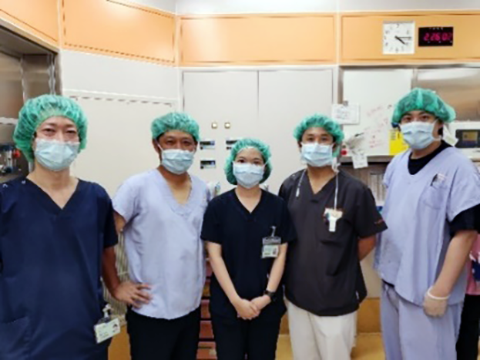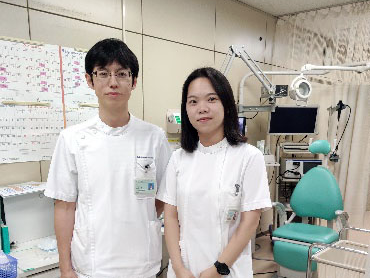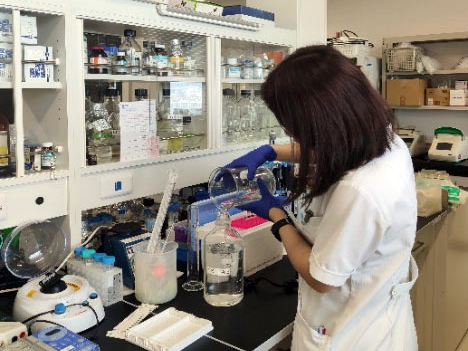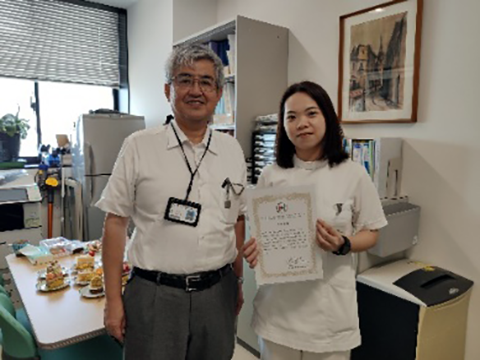国際・国内交流
張海霞(Haixia Zhang)さん(汕頭大学医学院 第4学年次)
Meaningful life at Hyogo College of Medicine
My name is Haixia Zhang, a fourth-grade student of Shantou University Medical School, who comes from China. I got a precious chance to study at Hyogo College of Medicine from 8 July to 2 August, 2019.
Schedule
It's beneficial for me to study at Hyogo College of Medicine for four weeks that I have been stayed in Otorhinolaryngology Head and Neck Surgery (ENT Department) and Biochemistry Departments for two weeks respectively. Briefly, in ENT Department,I went to operation room to see doctors operate the patient every Monday, Wednesday and Thursday. Furthermore, I went to Out-patient of ENT Department to observe doctors how to treat patients for other days. And in Biochemistry Department, I studied with Ran about some basic skills in laboratory and learned some papers about CHREBP which was studying by the tutor of Biochemistry. All schedules made me feel beneficial and unforgettable.
ENT Department
In the four weeks of short-term study at the Hyogo College of Medicine in Japan, what impressed me most was the clinical apprenticeship in the ENT Department for the first two weeks. In these two weeks, I went into the operating room to observe the doctor's surgery and went to the outpatient clinic. There are many differences between Chinese medical care and Japanese medical system. The operating room of the ENT Department is large and owns special equipment which is used to broadcast the situation of surgery to interns. In the process of observing the surgery, the doctor explained structures and the next step to me constantly, which made me feel involved in the operation together.
What surprised me most is that at the end of the operation, all the doctors and nurses will assist the anesthesiologist to remove the patient's anesthesia in the operating room and awaken the patient. Only when the patient's consciousness is restored, the operation can be truly completed. While in China, there are special clerk to wait patients to awake. I really marvel at the prudence and responsibility of Japanese doctors.
In the outpatient clinic, the doctor introduced that the Japanese medical system is different from Chinese. Japanese patients go to the township-level clinic for treatment first, and then go to the upper-level hospital to see the doctor with the introduction of the clinic. This not only solves the patient's problems in a timely manner, but also alleviate the pressure of diagnosis and treatment in many hospitals. After many visits to different doctors in the clinic, I found that many patients came back to the same doctor for a follow-up visit. During the treatment, doctors and patients talk about their physical condition as old friends. The doctor listens to the patient patiently and answer the patient's question with detailed pictures and images. What a harmourous relationship between doctors and patients.
What makes me surprised is that Japanese doctors are responsible for patients deeply. After each patient performs a series of tests at the clinic, the doctor will discuss the time of the next visit with the patient and arrange for the specific date. Some patients and doctors even have a referral appointment until the end of 2020. The doctors told me that they also had a follow-up relationship with patients for up to three or four years. I admire the trust and dependence between Japanese doctors and patients.
Biochemistry Department
Studying in the Biochemical laboratory, I mainly learned PCR, cell culture, protein extraction, Western Blot and other technologies every day. And the lab teacher showed me how to perform experiments firstly and then I will try to do it by myself. During the experiment, the teacher discussed the principle and significance of it with me when I encountered some interesting phenomena in the experiment. In the event of a failure of the experiment, the teacher also analyzed the problem and gave me some opinions, then we edified the experiment. What’s more, my teacher also provided a lot of articles published by their laboratory institute for me to study, I was introduced to a lot of CHREBP-related mechanisms and principle. It exposed me to the academic knowledge that I had rarely been involved in biochemical research before. It made me have a deeper understanding of basic research and stimulate my greater interest in it.
Go sightseeing
In our spare time, we will visit many Japanese tourist hotspots. The doctors in the department and the Japanese students enthusiastically recommended us several sightseeing spots that worth visiting. For example, we went to Nara, the deer could be seen everywhere on roads, we visited Kyoto with all kinds of beautiful and solemn shrines, and so on. Walking through the streets of Japan, I felt a sense of quiet comfort. And in the bustling commercial street, I felt like being surrounded by the cheerful atmosphere. Which made us experience the charm of Japan's native culture deeply.
This clinical experience showed me a lot of advanced things that different from the domestic medical environment system. At the same time, let me ponder how to become a good doctor, how to deal with the relationship with patients correctly. This time I am greatly beneficial from the exchanges at the Hyogo College of Medicine in Japan, which makes me have a stronger interest and determination to learn medical science more diligent in the future.



